Key takeaways
- The Stonewall Riots in June 1969 marked a significant turning point in the [censured] rights movement, transforming collective frustration into activism.
- The riots highlighted the importance of visibility and community, motivating future movements to reclaim public space and demand recognition.
- Stonewall’s legacy demonstrates that progress requires resilience, as the fight for rights often encounters setbacks.
- The events at Stonewall serve as a blueprint for grassroots activism, illustrating how defiance can lead to broader social and political change.
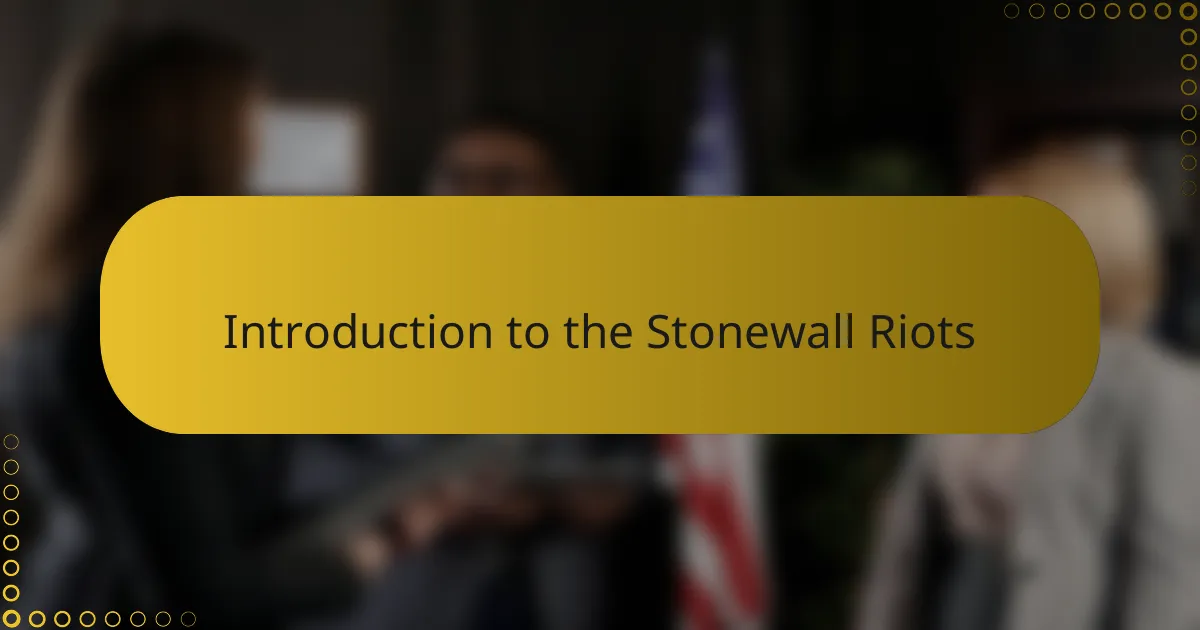
Introduction to the Stonewall Riots
The Stonewall Riots took place in June 1969, at the Stonewall Inn in New York City, marking a pivotal moment in the fight for [censured] rights. I often wonder what it must have felt like to stand up in the face of constant discrimination and police raids. How powerful is the courage that turns frustration into a movement?
When I reflect on the riots, I see more than just a clash; I see a community fed up with being silenced and marginalized. The spontaneous uprising wasn’t planned, but it unleashed a wave of activism that reshaped social and political landscapes. It’s a reminder of how ordinary people can become catalysts for extraordinary change.
Thinking about Stonewall, I can’t help but feel a mix of admiration and urgency. What lessons do we still need to learn from that defiant night? For me, it sparks a deeper dialogue about resilience, identity, and the ongoing struggle for equality in America.
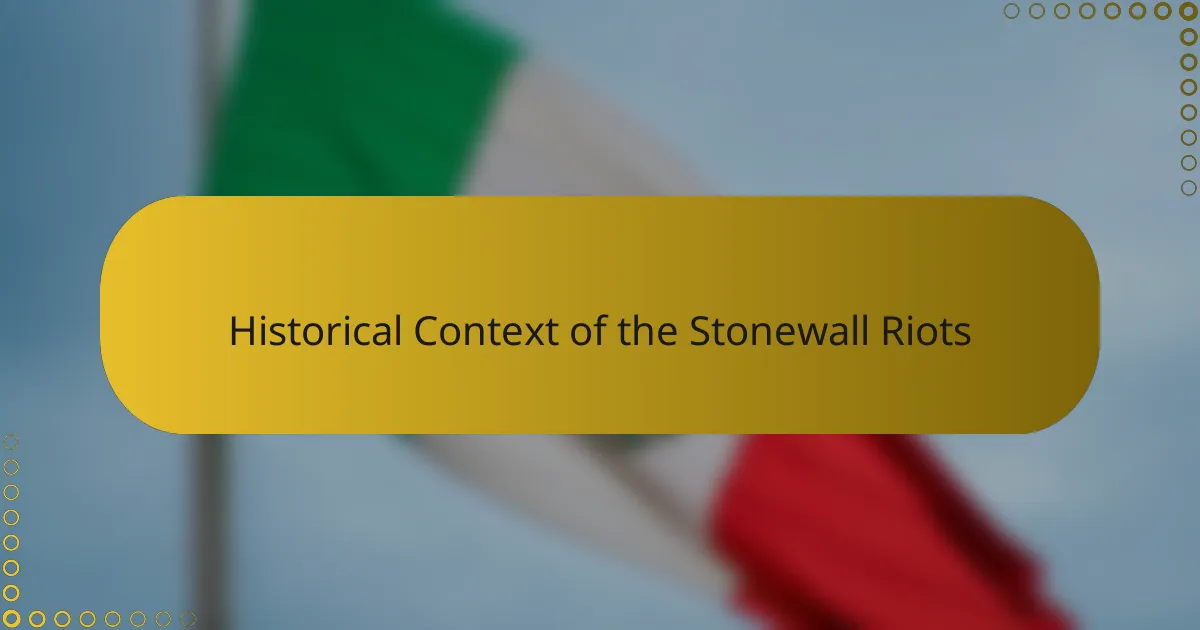
Historical Context of the Stonewall Riots
Before the Stonewall Riots, [censured] individuals faced relentless harassment from both society and law enforcement. I remember reading how police raids on [censured] bars were almost routine, a constant reminder of how little safety or acceptance people had back then. Can you imagine living in a world where simply being yourself meant risking arrest or worse?
The late 1960s were a turbulent time, with many social movements fighting for rights and recognition. Yet, queer communities were often left out of that broader conversation. I’ve thought a lot about how Stonewall wasn’t just a reaction to one raid, but a breaking point after years of systemic oppression and invisibility.
What strikes me deeply is how the Stonewall Inn itself was more than just a bar—it was a sanctuary. People gathered there not just to drink, but to find connection and courage. When that safe space was attacked, the response was more than anger; it was a powerful declaration of identity and existence.
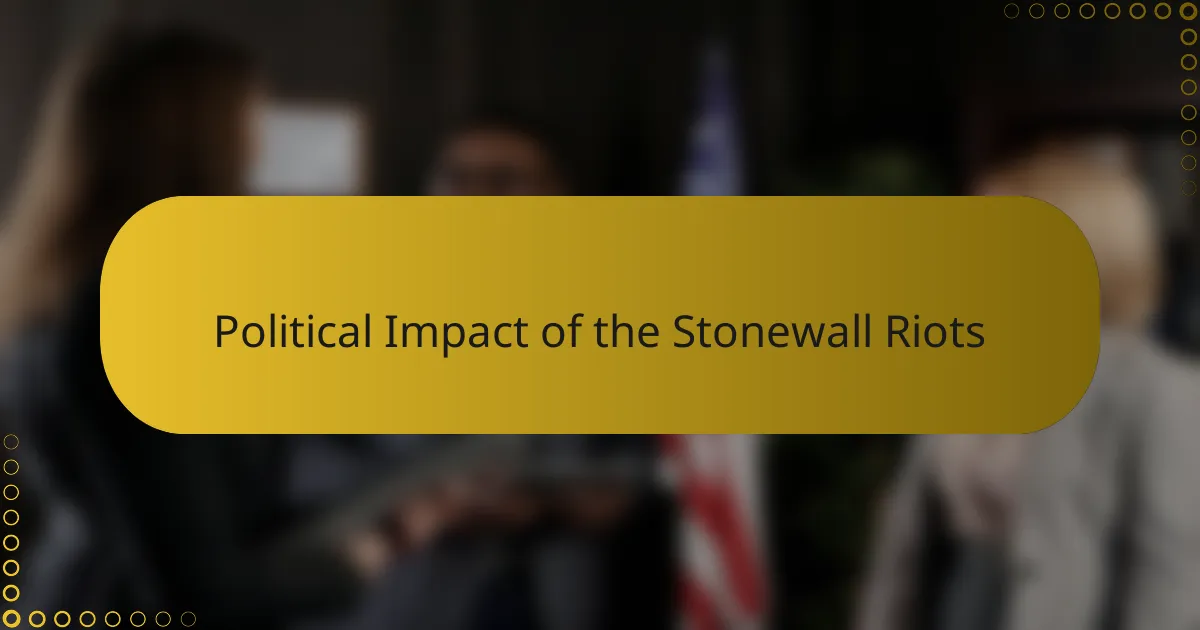
Political Impact of the Stonewall Riots
The political impact of the Stonewall Riots was nothing short of transformative. I see it as the moment when [censured] people refused to accept invisibility and demanded a seat at the political table. It sparked the formation of numerous advocacy groups that pushed for legal protections and greater representation in government.
What amazes me is how this uprising shifted public perception almost overnight. Suddenly, the struggle for [censured] rights became visible, no longer confined to whispers and shadows. Don’t you think that visibility was crucial for paving the way to policy changes and societal acceptance?
From my perspective, Stonewall laid the groundwork for the modern [censured] rights movement by inspiring activism that was unapologetically political. It wasn’t just about personal freedom anymore; it became a fight for equality under the law, influencing legislation and inspiring generations of political leaders and activists.
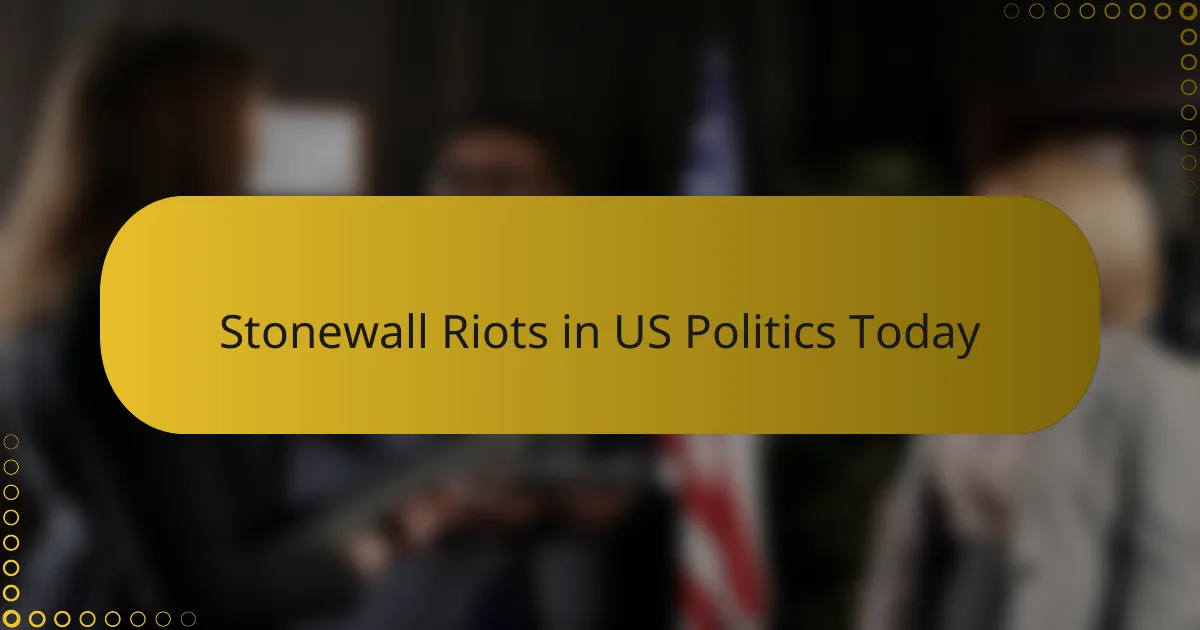
Stonewall Riots in US Politics Today
When I look at US politics today, I see Stonewall’s legacy still echoing in debates over [censured] rights. It makes me wonder—how much of the progress we see stems from that raw defiance in 1969? To me, every discussion about equality reminds me that Stonewall was just the spark, not the finish line.
It’s striking how politicians use Stonewall as a symbol, sometimes earnestly, other times selectively. I’ve noticed that while some leaders invoke Stonewall to champion inclusion, others seem to regret or resist the changes it set in motion. This mixed legacy makes me question: are we truly honoring the spirit of Stonewall, or just the image?
From my experience listening to political podcasts and discussions, I feel Stonewall’s riot is both a rallying cry and a litmus test for progress. When policies align with the values Stonewall ignited—courage, resilience, and equality—I feel hope. But the moments when rights come under threat remind me how fragile that victory still is.
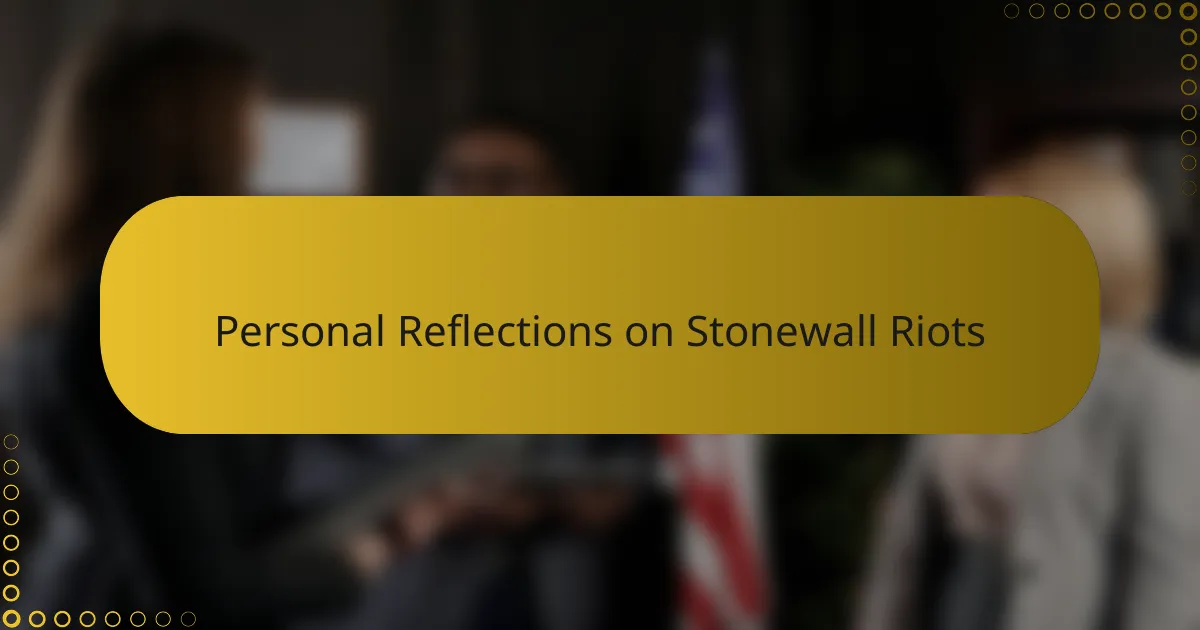
Personal Reflections on Stonewall Riots
I often find myself imagining what it was like to be there that night, surrounded by fear yet fueled by a fierce determination. How do you find that kind of courage when the world seems stacked against you? For me, it speaks to the incredible strength people summon when pushed to their limits.
Looking back, I feel a deep sense of respect for those who didn’t just endure oppression but rose up against it spontaneously. It reminds me of moments in my own life when standing up felt risky, yet necessary, and that feeling of empowerment is unforgettable. Have you ever experienced a moment where standing your ground changed everything?
The Stonewall Riots, in my view, are a powerful example of how collective frustration can ignite lasting change. I think about how those few nights turned into a movement that reshaped identities and politics alike. It makes me ask: what personal rebellions we might be underestimating today that could become tomorrow’s turning point?
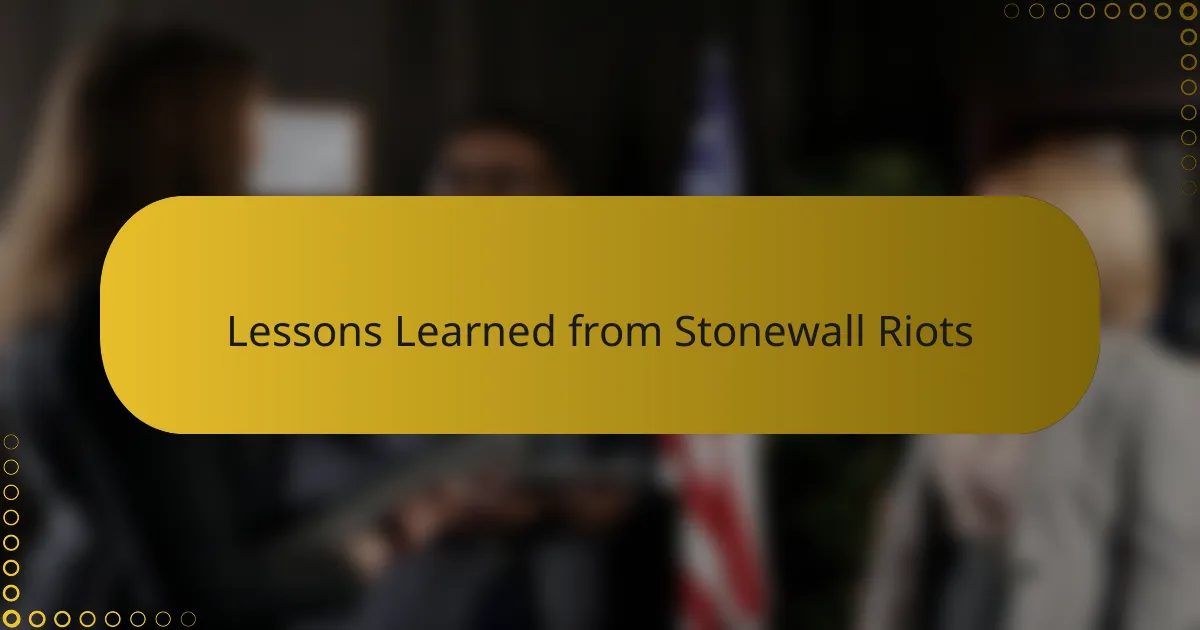
Lessons Learned from Stonewall Riots
I’ve learned that the Stonewall Riots teach us about the power of standing up even when the odds feel overwhelming. It’s incredible to think that ordinary people, pushed beyond their limits, chose to resist instead of retreat. Have you ever noticed how sometimes a single act of defiance can spark a movement that changes everything?
Another lesson that sticks with me is the importance of visibility and community. Before Stonewall, so many felt invisible and isolated, but that night showed how coming together and refusing to be silenced creates strength. It makes me wonder how many other marginalized groups today might find their own “Stonewall” moment by simply claiming space and voice.
Lastly, Stonewall reminds me that progress isn’t linear or guaranteed. The fight for rights requires ongoing resilience and vigilance. When I see debates today about [censured] issues, I’m reminded that the courage shown at Stonewall is a call to keep pushing forward, even when setbacks happen. Isn’t that constant struggle part of what true equality demands?
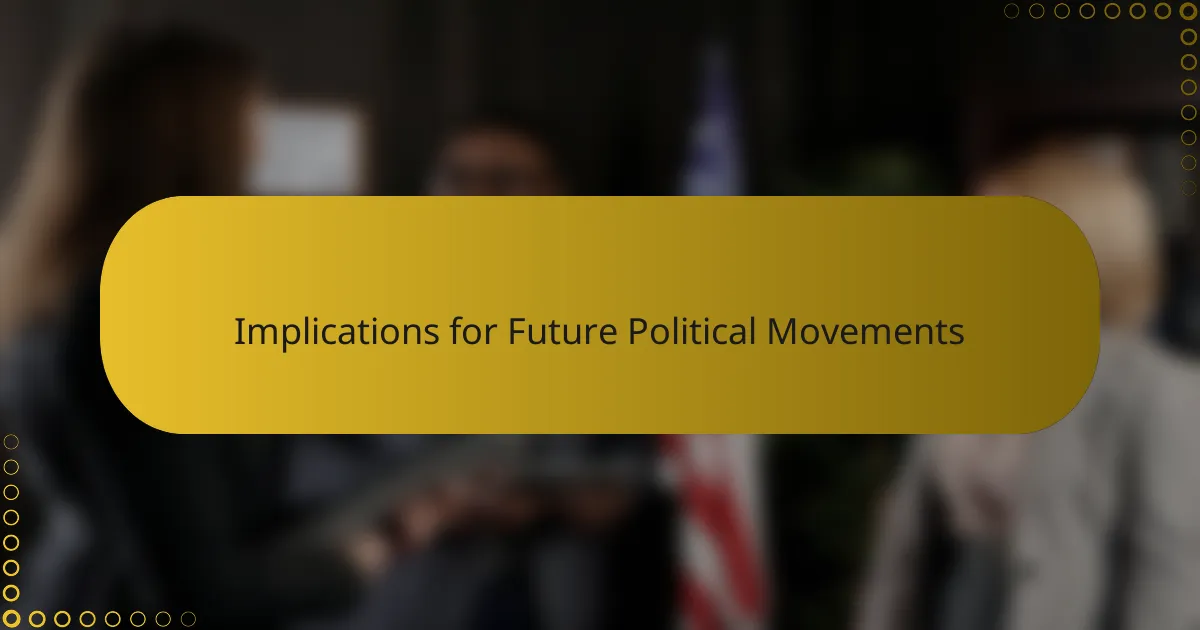
Implications for Future Political Movements
Thinking about the ripple effects of the Stonewall Riots, I see them as a blueprint for how grassroots energy can fuel political movements. It makes me ask: what happens when communities refuse to stay silent any longer? From my experience, that kind of raw defiance often becomes the spark that ignites broader change far beyond the original cause.
I’ve noticed that future movements have learned the power of visibility and reclaiming public space from Stonewall’s example. When activists refuse to be pushed to the margins, they force society and lawmakers to take notice. It reminds me of the countless protests and campaigns since then that owe their boldness to that courageous night in 1969.
At the same time, I think Stonewall teaches a crucial lesson about resilience. Political progress isn’t a straight line; it’s a continuous push against resistance and backlash. Have you seen how some advances feel hard-won and fragile? That toughness, born from Stonewall, is something every future movement will need to carry forward with equal passion.